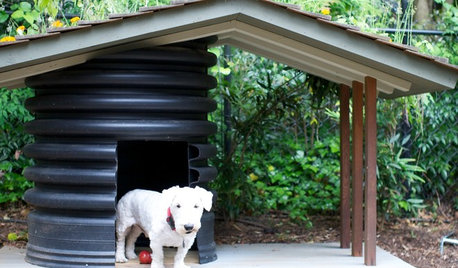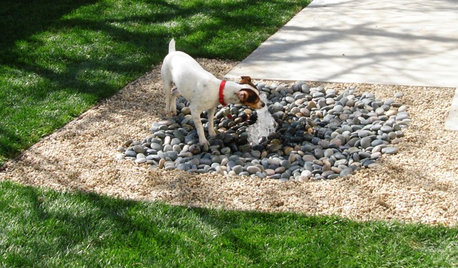My dog growls and shows his teeth at me
fourfirstnames
11 years ago
Featured Answer
Comments (25)
annzgw
11 years agolast modified: 9 years agoarkansas girl
11 years agolast modified: 9 years agoRelated Discussions
Do you brush your dog's teeth?
Comments (3)I also feed raw. My dogs' teeth are so clean they almost glow in the dark. I had a stranger stop me on one of our walks in the woods to admire their teeth - then she said, "I'm a dental hygienist, so I should know!" Try giving a few raw meaty bones each week and see if you notice a difference. I'm not a raw-food fanatic... but besides the tooth-cleaning aspect, my dogs seem to get a deep satisfaction over a long session of bone-gnawing. No fighting - they pass the bone back and forth for a few hours, and then I toss it when they lose interest....See MoreGrowling dog
Comments (19)Thank you everyone for your replies. I did, in fact, call the trainer and Belle went in for a "behavior assessment". The trainer could not get her to show any aggression. She is uncomfortable with anyone touching her nails, but we (the trainer, myself, husband and kids) can touch them/manipulate her paws. He did recommend that she be kept off the couch for the time being. He felt everything we have been doing was appropriate in correcting her. Her previous owner was elderly and Belle did not have any leash/obedience training at all up to this point. (He passed away in July.) She has made remarkable progress with the leash, basic manners and obedience. She was kid/cat tested by the shelter, and our trainer put her through several different scenarios before she entered the class. His assessment was "friendly, super-confident, no apparent issues with cats or children. He did think she was somewhat stubborn and easily distracted. (That's why we're in dog school - so MOM can be trained to help the dog!!) My kids are 16 and 12. We talked about what the trainer said this morning, so we could all be in agreement over the couch issue, and if there is any further incident, to correct her. I do like the idea of "time out", as she absolutlely loves to be with people and will follow us around like a shadow. As soon as she is corrected for any misbehavior she shows submissive behavior. When I'm at work all day, she sleeps in her crate or in her bed but is SO EXCITED when we come in the door in the afternoon. I would never allow small children around ANY dog without my supervision. This goes even for my small 6 pound cat as well, you just don't know what can happen with small children and animals. I appreciate your thoughtful replies and concern. Will keep you all posted....See MoreDark dog teeth
Comments (2)My 8+ year old Rottie K'Ehleyr has a broken dead tooth that is dark brown. We're doing the same thing- watching it for signs of pain/infection. The one thing I would watch for specifically is that dead teeth tend to break easily, and you don't want the root to be exposed. That can lead to septicemia and infections of other organs, obviously not a good thing. If that happens, even if there is not pain or obvious infection, I'm having the tooth removed. Last time I priced a root canal it was $900, and that was several years ago. Removing the tooth is much less (about $300 with the full prophy including bloodwork and pain meds)....See MoreI need advice for a growling dog.
Comments (22)until you are confident that all 3 dogs can take treats from you while being in close proximity to each other, it's best to train them separately. when i get to to the point where i know for sure they will each wait their turn (it doesn't take all that long once they learn the game), i line them all up with treats ready. i will say a name...eden, watch me! and as soon as she makes eye contact, TREAT! same thing with destiny and olivia. they are smart and not only do they know their own names, they know who i am talking about or to when i say another name. this is going on while they are all standing in front of me and practically nose-to-nose with each other. and, since eden is new here and she has yet to be trained to the underground fence, she might wander a little too far. if she gets out of my sight, i can ask the other dogs "where did eden go?" and they will look in the exact direction, without fail. i jump on the golf cart and sure enough, she's right where they *said* she would be. LOL another way you can do it is to use a different phrase, one for each dog. "watch me!", "look here!", "see this!". try to make them as different sounding as you can so they will learn which one applies to them. lori, i think it's wonderful that you are so open to suggestions. so many times, i give people this sort of advice and they ignore it to the detriment of their pets. i am no dog trainer, by any stretch of the imagination. i just try to use as much common sense as i can and lots of positive reinforcement and i have found that it goes a long way in training dogs. and some dehydrated liver treats ain't too shabby for training either! i'm sorry for the loss of your kitty. i've suffered the loss of 3 rescued danes over the last 2 years so i know the hurt all too well. awesome for you that you open your home to rescues! it is so rewarding!...See Morekathleen44
11 years agolast modified: 9 years agoLily316
11 years agolast modified: 9 years agogardenandcats
11 years agolast modified: 9 years agospedigrees z4VT
11 years agolast modified: 9 years agotrancegemini_wa
11 years agolast modified: 9 years agotexasredhead
11 years agolast modified: 9 years agofourfirstnames
11 years agolast modified: 9 years agoannzgw
11 years agolast modified: 9 years agoLily316
11 years agolast modified: 9 years agocalliope
11 years agolast modified: 9 years agoms_minnamouse
11 years agolast modified: 9 years agoms_minnamouse
11 years agolast modified: 9 years agoluvdogs
11 years agolast modified: 9 years agoluvdogs
11 years agolast modified: 9 years agoms_minnamouse
11 years agolast modified: 9 years agoUser
11 years agolast modified: 9 years agoms_minnamouse
11 years agolast modified: 9 years agoUser
11 years agolast modified: 9 years agoms_minnamouse
11 years agolast modified: 9 years agoUser
11 years agolast modified: 9 years agoGabbie Foremann
3 years agokbradshaw8
3 years ago
Related Stories

KITCHEN DESIGNPro Chefs Dish on Kitchens: Paul Kahan Shows His Urban Sanctuary
Peek inside Kahan's newly redone home kitchen and learn what he considers most important for a cooking space
Full Story
PETSHouzz Call: Show Us Your Summer-Loving Dog!
Share a photo of your pooch kicking back in the backyard, helping you in the workshop or enjoying your favorite summer getaway
Full Story
REMODELING GUIDESOne Guy Found a $175,000 Comic in His Wall. What Has Your Home Hidden?
Have you found a treasure, large or small, when remodeling your house? We want to see it!
Full Story

DESIGNER SHOWCASESSee the Daring Designs at the 2013 Kip's Bay Decorator Show House
New York designers show their latest creations in a fashion show for the home
Full Story
LIFEHouzz Call: Show Us the House You Grew Up In
Share a photo and story about your childhood home. Does it influence your design tastes today?
Full Story
PETSHow to Help Your Dog Be a Good Neighbor
Good fences certainly help, but be sure to introduce your pup to the neighbors and check in from time to time
Full Story
Houzz Call: Show Us Your Garden Gnomes
These decorative little German characters are popular again. Share a photo of yours, and it might appear in a featured ideabook
Full Story
ECLECTIC HOMESHouzz Tour: An Eclectic Sanctuary Shows a Couple's True Colors
Travel takeaways, religious totems, thrift store finds and unusual compositions personalize a Melbourne home
Full Story
PETSHere’s How to Show Your Pet Even More Love
February 20 is Love Your Pet Day. Find all the ideas and inspiration you need to celebrate right here
Full Story



annzgw